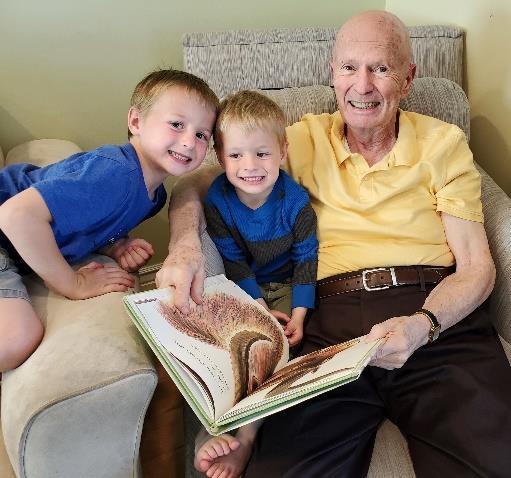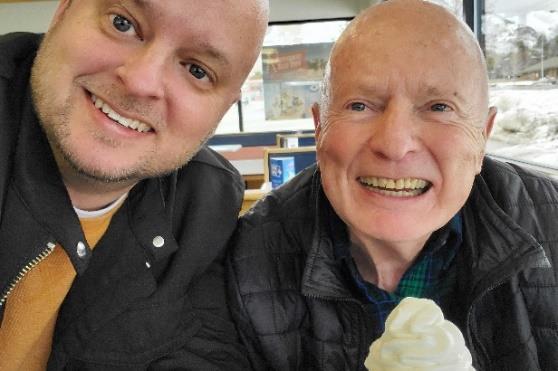Loneliness, A Health Risk of Epidemic Proportion
 At Home: When my husband, Dennis, was first diagnosed as being in the early stages of Alzheimer’s
disease, I was told to expect that he would gradually have more difficulty planning
and initiating a healthy variety of activities, but that it would help his emotional
health and mental abilities to interact with other people. Knowing this prompted me
to take the initiative when it came to planning things we could do together, and to
suggest things he could do on his own or with friends and family.
At Home: When my husband, Dennis, was first diagnosed as being in the early stages of Alzheimer’s
disease, I was told to expect that he would gradually have more difficulty planning
and initiating a healthy variety of activities, but that it would help his emotional
health and mental abilities to interact with other people. Knowing this prompted me
to take the initiative when it came to planning things we could do together, and to
suggest things he could do on his own or with friends and family.
Husband, Dennis, reading with grandkids.
Living with Kids: I have a friend who has Parkinson’s disease. His physical struggles have made it unsafe for him to live alone, so three of his children take turns caring for him in their homes. In one of our phone conversations, he shared with me that despite being with his children and their children, he felt lonely because “no one talks to me.” I’m sure they feel they are there for him, but their busy lives and lack of time devoted specifically to social contact with him has left him still feeling isolated.
In Assisted Living: From age 95-97, my dad lived in a very nice assisted/senior-living center apartment. He often said, “This is a lovely place, but I’m very lonely.” We made sure that at least one of his children was there for a visit every day of the week, but we were at a loss to know what else we could do. The center offered several activities each day, and they reminded him to participate, but his dementia kept him from developing any satisfying friendships. Keeping Dad active and trying to prevent him from feeling lonely took a lot of effort.
If you are the caregiver of an elderly parent or spouse, you may have experienced the same thing. The responsibility may fall on you to keep your loved one busy and involved with other people. Loneliness and boredom that leads to depression are major considerations in many homes assisted living facilities. No matter the circumstances, loneliness can be a reality and a danger to seniors.
A Health Risk of Epidemic-Proportion
Loneliness has been called an “invisible epidemic” that affects 60+ million Americans. Recent data from the University of Michigan National Poll on Healthy Agine (NPHA) indicates that in 2023, one in three adults aged 50-80 (34%) reported feeling isolated from others in the past year, while more than one in three older adults (37%) felt a lack of companionship during the same period.
A New York Times article stated, “Researchers have found mounting evidence linking loneliness to physical illness and to functional and cognitive decline. As a predictor of early death, loneliness eclipses obesity.” Loneliness also leads to significantly higher rates of declining mobility and difficulty in performing routine daily activities. People who have strong ties to family and friends are as much as 50 percent less at risk of dying over any given period than those with fewer social connections.
Need to Keep Seniors Busy and Social Is Universal
When adults reach their later years, they begin to experience some significant changes in their physical and mental health that tend to limit their activity. We may think of difficulty with memory as the first mental symptom to appear, but often the first noticeable changes are more related to cognitive abilities—the ability to make plans and carry them out, the ability to follow directions, the ability to use language as effectively—all changes that affect a person’s ability to participate in stimulating activities.
Many seniors need support in more ways than just help with remembering words and upcoming events. Meaningful activities and opportunities to socialize are vital in helping them maintain their ability to live independently and live longer, happier lives, no matter what their physical problems may be.
Community Help for Seniors and Caregivers
As long as a senior’s physical health doesn’t limit their mobility to the point of keeping them homebound, helping them to get involved in community-based programs that promote social interaction and physical activities can be a win/win for both senior and caregiver. Your community may have a Senior Center that offers free exercise programs, various classes geared to older learners, or other skill-building activities like art and music that allow seniors to interact with others and fill their days. Many organizations can use senior volunteers to perform tasks that are neither too mentally nor physically taxing.
Alleviating Feelings of Isolation
The causes for feelings of loneliness and isolation can vary widely. Not having access to transportation may prevent traveling to activities outside the home. As long as your loved one is able to move about, arranging for or providing transportation to activities in the community or church may be all he or she needs to become involved. A social network and a sense of community with family and other seniors helps to prevent a feeling of isolation and not fitting in. Even a short scenic drive can help.
When a person’s physical health limits their mobility and makes it difficult to leave their home, arranging regular visits from family, friends or even professional in-home aides who read, play games, do puzzles or simply visit and reminisce can be a big boost to mental health. Places of worship or senior care providers may be able to offer home-visitation services, companionship or respite care.
Research shows that men tend to have fewer social networks than women and are more likely to experience isolation. Men might need more encouragement and ideas of how to keep busy and be social than women do.
Senior Isolation Is a Social and Health Issue that Affects Everyone
The National Institute of Aging has identified regular stimulation as a major factor in quality of life between groups of seniors. Those who are mentally stimulated and enjoy social interaction are less likely to suffer from chronic illness and physical limitations. Isolation leads to multiple physical and emotional issues, including:
- Feeling worthless
- Feeling that life is no longer worth living
- Feeling intense restlessness
- Feeling unloved or uncared about
- Feeling suicidal
Some Things You Can Do for Your Loved One Who Is Lonely
If someone you care for is lonely, these suggestions may help, depending on current health and mobility:
- Don’t text. Use the phone and talk to them.
- If you don’t get a return call, call back.
- Plan a low-key activity, like a walk.
- Help them practice saying “hello” to everyone.
- Give them the opportunity to meet new people.
- Contact a friend with whom they’ve lost touch and help them meet for lunch.
- Introduce a new hobby that fits their current abilities.
 The internet can be a valuable resource that points you to helpful services. Utahns
can find resources through their local Area Agency on Aging on the Utah Commission
on Aging’s (UCOA) website. Their goal is to make sure “every Utahn is encircled with a caring support network,
enjoys social connections, does not feel isolated, and has access to grief and loss
resources.”
The internet can be a valuable resource that points you to helpful services. Utahns
can find resources through their local Area Agency on Aging on the Utah Commission
on Aging’s (UCOA) website. Their goal is to make sure “every Utahn is encircled with a caring support network,
enjoys social connections, does not feel isolated, and has access to grief and loss
resources.”
Son, David, taking Dennis out for Ice Cream
